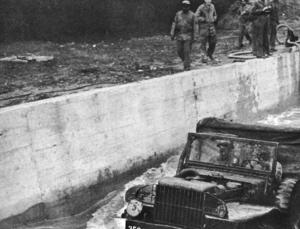 Some people may think basement waterproofing is a new technology. However, techniques for preventing water from entering a house or building have been around for hundreds of years. While the first liquid waterproofing coatings natural bitumen can be dated back to biblical times, the first known cellar drainage attempts date back to the 1800s.
Some people may think basement waterproofing is a new technology. However, techniques for preventing water from entering a house or building have been around for hundreds of years. While the first liquid waterproofing coatings natural bitumen can be dated back to biblical times, the first known cellar drainage attempts date back to the 1800s.
During that time the U.S. was more of an agricultural society where cellars and basements were used to keep food storage cool. These root cellars were not immune from water infiltration problems. During this era, drains tiles were commonly used for farm drainage and it is noted in the book “Farm Drainage” by the man who invented the French Drain, Henry French, was also pushing the idea of cellar drainage. He experimented with trying to drain his own cellar between 1850 and 1854.
The waterproofing industry gained steam in wet regions of the country specifically the Midwest, the Northeast, and parts of the South. The waterproofing businesses were commonly family-owned businesses and the trade was passed down through the generations. There are still companies today that started in the 1920s.
In the 1970s and 1980s there was a waterproofing company boom where multiple franchises were created. Thousands of basement waterproofing specialty contractors started during this time. Many chose this field because it was easy, unregulated and had large profit margins. The problem was these untrained contractors new to the industry didn’t take the time to learn the field. In essence, some of the old time solutions were lost. This led to many companies turning into fly-by-night contractors and giving the industry a bit of a black eye.
The next few decades, technology had a chance to make up the difference. Advancements in technology inspired chemists and waterproofing manufacturers alike to develop new products to better serve the industry. The waterproofing manufacturers created solutions and started certifying contractors. The National Association of Waterproofing and Structural Repair Contractors (now known as the Basement Health Association) was created and also developed a certification program to educate contractors and build ethics within the industry.
Still today, the waterproofing industry is somewhat unregulated because there are many ways to effectively control water and stop it from entering a basement. Therefore, there is not only one right way, or absolute solution for every house. Water infiltration happens for different reasons and every situation is different. However, even though the industry doesn’t say there is only one way to waterproof a basement, the technological advances and ethical standards have raised the bar for the waterproofing industry.
Waterproofing contractors today are more concerned about how their work in the basement impacts the whole home’s environment. Waterproofing contractors today are armed with more knowledge of mold, pests, indoor air quality and radon. As homes are more energy efficient with a tighter building envelop, the basement environment is looked at more closely. Also, more people are converting the basement to living space making basement waterproofing even more important and prevalent.